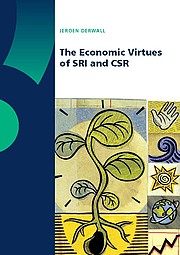The Economic Virtues of SRI and CSR Defended on Thursday, 1 March 2007
Financial markets and company managers are increasingly acknowledging the concepts of socially responsible investing (SRI) and corporate social responsibility (CSR), but not without reservations. These hesitations are largely attributable to ongoing debates about a potential conflict between social responsibility goals and the traditional financial objectives of investors and companies. This thesis bundles six empirical studies that deepen our understanding of the economic value of SRI and CSR. Several empirical questions underlie these studies, such as: do CSR practices improve a firm’s profitability? Do financial markets value corporate social responsibility? Do SRI criteria constrain investment portfolio optimization, or do they help investors in their hunt for underpriced securities? This thesis shows that SRI and CSR can be studied in new ways to answer these questions. We examine unique SRI stock portfolios with superior return/risk profiles, and provide a fresh look at strategies for investors in SRI mutual funds. By analyzing a wide range of pathways that lead CSR to interrelated measures of corporate financial performance, we further explain whether CSR carries value-relevant information. Taken together, the six studies discuss the channels of transmission from CSR to operating performance, the cost of capital, firm value, analysts’ earnings expectations, and stock return. The conclusions from this dissertation are that (i) integrating SRI criteria into portfolio construction does not negatively affect investment performance; (ii) investors can use information on firms’ eco-efficiency to make investment decisions that improve the return/risk profile of their portfolios; (iii) common CSR attributes, such as corporate environmental responsibility, and human capital management, have a significant association with traditional measures of corporate performance. We recommend making CSR salient to investors in the form of extra-financial information, with an emphasis on environmental, social, and corporate governance themes.









